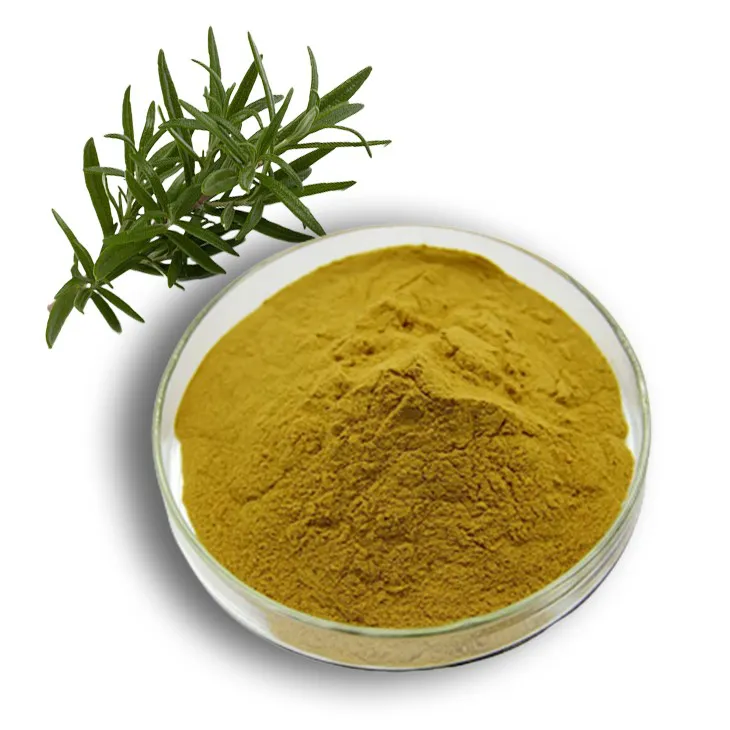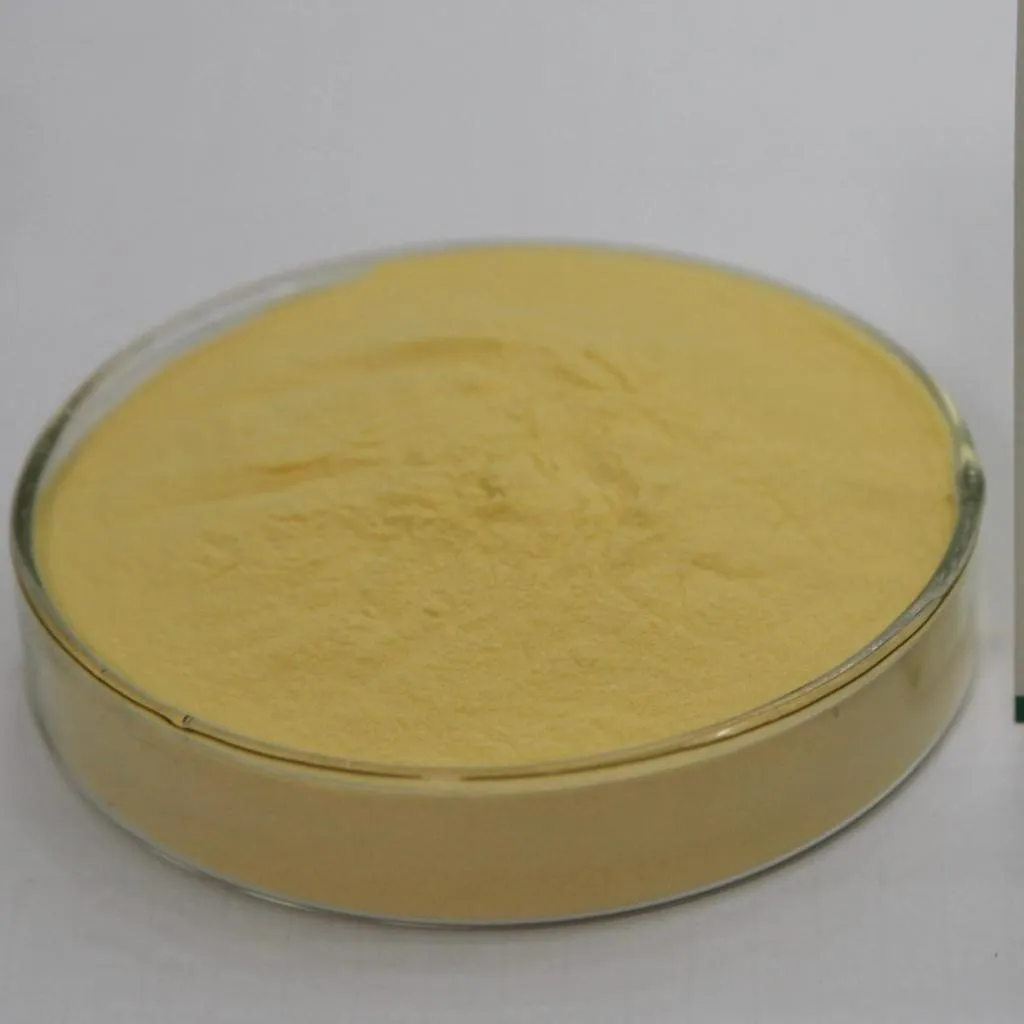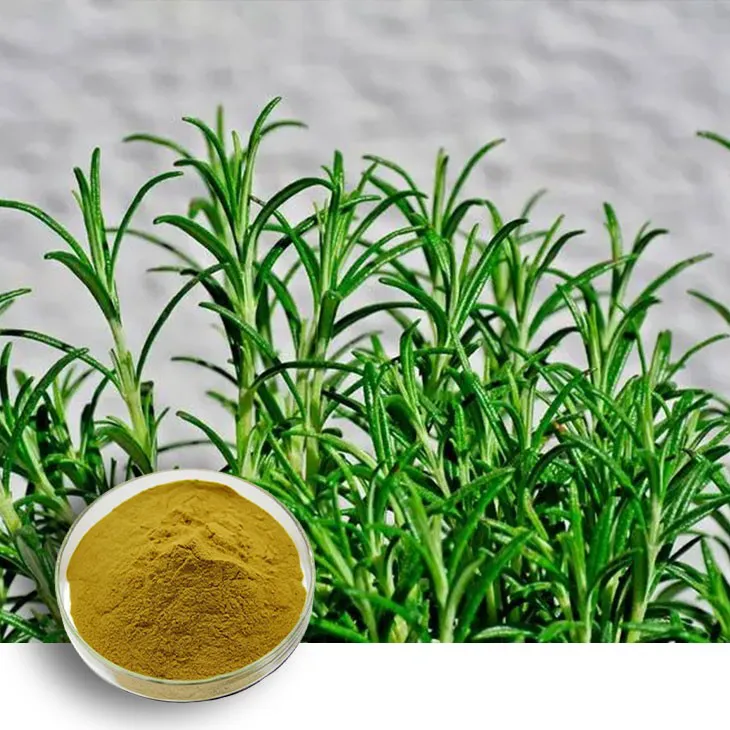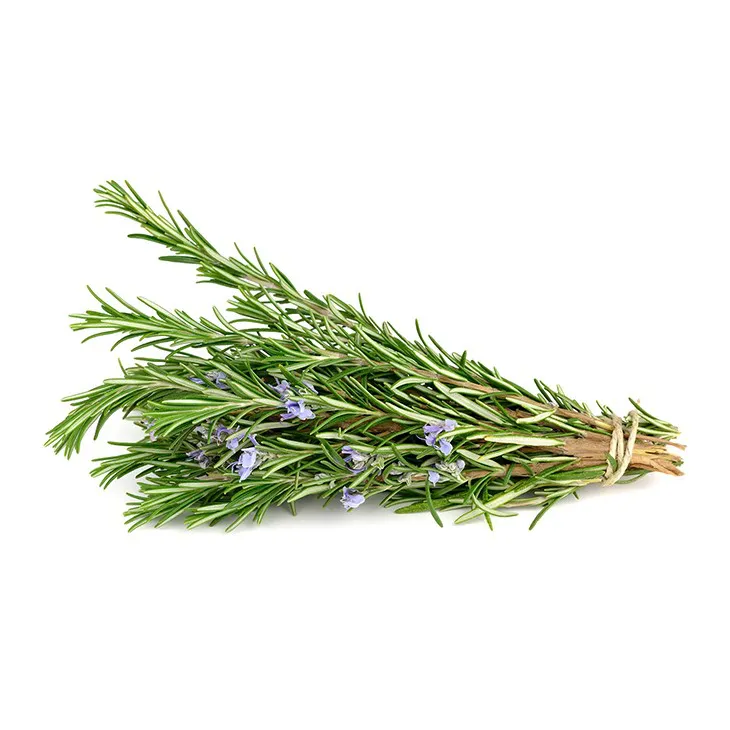- 0086-571-85302990
- sales@greenskybio.com
Powerful Rosemary Extract: Its Role in Athletic Performance
2024-11-13

1. Introduction
In the highly competitive world of sports, athletes are constantly seeking ways to gain an edge in performance. Whether it's improving physical strength, enhancing reaction time, or achieving better overall fitness, every little advantage can make a significant difference. One such emerging player in the field of sports performance enhancement is Rosemary extract. Rosemary, a common herb known for its culinary uses, has been found to possess a range of properties that could potentially revolutionize the way athletes train and compete.

2. The Chemical Composition of Rosemary extract
Rosemary extract is rich in a variety of bioactive compounds. One of the most important groups is the phenolic
compounds, which include rosmarinic acid, carnosic acid, and carnosol. These phenolic compounds are
responsible for much of the extract's antioxidant activity.
Rosmarinic acid, in particular, has been studied extensively for its anti - inflammatory and antioxidant
properties. It is a natural compound that can scavenge free radicals in the body, protecting cells from oxidative
damage. This is crucial for athletes as intense physical activity can lead to an increase in free radical
production, which can in turn cause muscle fatigue and impair performance.
Carnosic acid and carnosol also play important roles. They have been shown to have antioxidant
effects and may also interact with cellular signaling pathways, potentially influencing processes such as muscle
protein synthesis and energy metabolism.

3. Antioxidant Properties and Their Impact on Athletic Performance
3.1. Protection Against Oxidative Stress
During exercise, the body's metabolic rate increases significantly, leading to a higher production of
reactive oxygen species (ROS). These ROS can cause oxidative stress, which damages cells, tissues, and
organs. The antioxidant properties of rosemary extract can help neutralize these ROS, reducing oxidative
stress. By protecting cells from damage, athletes may experience less muscle soreness and fatigue, allowing
them to train harder and more frequently.
For example, a study on endurance athletes showed that those who supplemented with rosemary extract had
lower levels of markers associated with oxidative stress compared to those who did not. This suggests that
the extract was able to protect their cells from the harmful effects of exercise - induced oxidative stress.
Faster muscle recovery is essential for athletes who need to train regularly. The antioxidant activity of
rosemary extract can aid in muscle recovery by reducing inflammation and oxidative damage. When muscles are
damaged during exercise, the body initiates a repair process. However, oxidative stress can slow down this
process. By reducing oxidative stress, rosemary extract may help speed up muscle repair and regeneration,
enabling athletes to get back to training sooner.
In a laboratory experiment, muscle cells exposed to rosemary extract showed enhanced recovery after
simulated exercise - induced damage compared to control cells. This indicates that the extract has a
positive impact on muscle recovery at the cellular level.

4. Modulation of Physiological Responses
4.1. Influence on Energy Metabolism
Rosemary extract may play a role in modulating energy metabolism. It could potentially enhance the body's
ability to use stored energy sources such as glycogen and fat. By improving the efficiency of energy
metabolism, athletes may experience increased endurance during long - duration activities.
Some research suggests that the bioactive compounds in rosemary extract may interact with enzymes involved
in energy production pathways. For instance, they may influence the activity of enzymes that break down
glycogen or mobilize fat stores. This could lead to a more efficient utilization of energy substrates,
providing athletes with a steady supply of energy during exercise.
Muscle protein synthesis is crucial for muscle growth and repair. Rosemary extract may have a positive
influence on muscle protein synthesis. The bioactive compounds in the extract could potentially stimulate
the cellular signaling pathways involved in protein synthesis.
In a study on resistance - trained athletes, those who supplemented with rosemary extract showed a trend
towards increased muscle protein synthesis compared to the control group. Although more research is needed
to fully understand this mechanism, it suggests that rosemary extract could be beneficial for athletes
looking to build muscle mass and strength.

5. Effects on Reaction Time
5.1. Neuroprotective Effects
The antioxidant and anti - inflammatory properties of rosemary extract may also have neuroprotective
effects. The brain is highly sensitive to oxidative stress and inflammation, which can occur during intense
physical activity. By protecting brain cells from damage, rosemary extract may help maintain optimal neural
function, which is essential for quick reaction times.
In a study on cognitive performance during exercise, participants who took rosemary extract showed better
reaction times compared to those who did not. This could be due to the extract's ability to protect the
neural pathways involved in reaction time.
Rosemary extract may also influence nervous system signaling. It could potentially enhance the
transmission of nerve impulses, which is important for quick and accurate reactions. Some of the bioactive
compounds in the extract have been shown to interact with neurotransmitter systems in the brain.
For example, they may affect the release or re - uptake of neurotransmitters such as dopamine, which is
involved in motor control and reaction time. By modulating neurotransmitter activity, rosemary extract may
help athletes react more quickly to stimuli during competition.
6. Practical Applications for Athletes
6.1. Supplementation
Athletes can consider supplementing with rosemary extract in the form of capsules or powders. However, it is
important to ensure that the product is of high quality and from a reliable source. Dosage recommendations
may vary depending on factors such as body weight, type of sport, and training intensity. It is advisable to
consult a sports nutritionist or a healthcare professional before starting supplementation.
For example, in a typical supplementation regime for an endurance athlete, a daily dose of 500 - 1000 mg of
rosemary extract may be appropriate. This should be taken in divided doses throughout the day to ensure
continuous antioxidant protection.
Another way for athletes to benefit from rosemary is by incorporating it into their diet. Rosemary can be
used fresh or dried in cooking. It can be added to meat dishes, salads, or soups, adding flavor while also
providing its beneficial properties.
For instance, a post - workout meal could include a chicken salad with fresh rosemary. This not only provides
a source of protein for muscle repair but also the antioxidant and other beneficial compounds from the
rosemary.
7. Safety and Precautions
While rosemary extract has shown many potential benefits for athletic performance, it is important to be aware
of safety and precautions. In general, rosemary extract is considered safe when taken in recommended doses.
However, some people may be allergic to rosemary, and in such cases, supplementation should be avoided.
Also, high - dose long - term supplementation may have potential side effects. For example, it could interact
with certain medications. Athletes who are taking medications should consult their doctor before starting
rosemary extract supplementation to ensure there are no potential drug - extract interactions.
8. Conclusion
Rosemary extract has emerged as a promising natural supplement for enhancing athletic performance. Its antioxidant properties, ability to modulate physiological responses, and potential effects on reaction time make it an attractive option for athletes. Whether through supplementation or dietary inclusion, rosemary extract can potentially offer a range of benefits from reducing muscle fatigue and improving recovery to enhancing overall performance. However, more research is still needed to fully understand its mechanisms of action and to optimize its use in the athletic community. Athletes should also approach supplementation cautiously, taking into account safety and potential interactions with medications.
FAQ:
What are the antioxidant capabilities of rosemary extract?
Rosemary extract contains various bioactive compounds such as carnosic acid and rosmarinic acid. These compounds are powerful antioxidants. They can scavenge free radicals in the body, which are unstable molecules that can cause damage to cells, proteins, and DNA. By neutralizing free radicals, the antioxidant capabilities of rosemary extract help to reduce oxidative stress. This is beneficial for athletes as high - intensity exercise often leads to increased oxidative stress, and reducing it can support overall health and performance.
How does rosemary extract enhance physical strength?
One way rosemary extract may enhance physical strength is through its anti - inflammatory properties. Inflammation can impede muscle function and recovery. The bioactive compounds in rosemary extract can help reduce inflammation in the muscles. Additionally, it may improve blood circulation, allowing for better delivery of nutrients and oxygen to the muscles. This can enhance muscle performance and contribute to increased physical strength during exercise.
Can rosemary extract really improve reaction time?
There is evidence to suggest that rosemary extract can potentially improve reaction time. It may act on the nervous system by modulating neurotransmitter levels. For example, it could influence the release or uptake of neurotransmitters involved in quick decision - making and motor responses. However, more research is needed to fully understand the mechanisms and the extent of its effect on reaction time in different athletic scenarios.
What are the potential side effects of using rosemary extract for sports performance?
When used in moderation, rosemary extract is generally considered safe. However, in some cases, high doses may cause digestive issues such as stomach upset or diarrhea. Also, some individuals may be allergic to rosemary or its components. It's important for athletes to start with a small dose and monitor their body's response when using rosemary extract for sports performance enhancement.
How should rosemary extract be consumed for optimal sports performance?
Rosemary extract can be consumed in various forms. It is available as a dietary supplement in capsules or tablets. Some athletes may also choose to consume it in the form of rosemary - infused oils or teas. However, it's crucial to follow the recommended dosage instructions. Combining its consumption with a balanced diet and proper exercise routine is also essential for achieving optimal sports performance.
Related literature
- The Role of Rosemary Extract in Oxidative Stress and Inflammation in Athletes"
- "Rosemary Extract and Muscle Function: A Scientific Review"
- "Neurotransmitter Modulation by Rosemary Extract: Implications for Reaction Time in Sports"
- ▶ Hesperidin
- ▶ citrus bioflavonoids
- ▶ plant extract
- ▶ lycopene
- ▶ Diosmin
- ▶ Grape seed extract
- ▶ Sea buckthorn Juice Powder
- ▶ Beetroot powder
- ▶ Hops Extract
- ▶ Artichoke Extract
- ▶ Reishi mushroom extract
- ▶ Astaxanthin
- ▶ Green Tea Extract
- ▶ Curcumin Extract
- ▶ Horse Chestnut Extract
- ▶ Other Problems
- ▶ Boswellia Serrata Extract
- ▶ Resveratrol Extract
- ▶ Marigold Extract
- ▶ Grape Leaf Extract
- ▶ blog3
- ▶ blog4
- ▶ blog5
-
Organic Tongkat Ali extract powder factory.
2024-11-13
-
How to make powder with ashwagandha extract.
2024-11-13
-
Rosehip extract manufacturers from China.
2024-11-13
-
The best cat's claw extract in nature.
2024-11-13
-
Chinese Dandelion Leaf Extract Suppliers.
2024-11-13
-
American Ginseng Root Extract
2024-11-13
-
Oat Straw Extract Powder
2024-11-13
-
Camu Camu Extract
2024-11-13
-
Acerola Juice Powder
2024-11-13
-
Cocoa Extract
2024-11-13
-
Aminolevulinic acid
2024-11-13
-
Nutmeg Extract
2024-11-13
-
Echinacea Extract
2024-11-13
-
White Peony Extract
2024-11-13
-
Hops Extract
2024-11-13





















